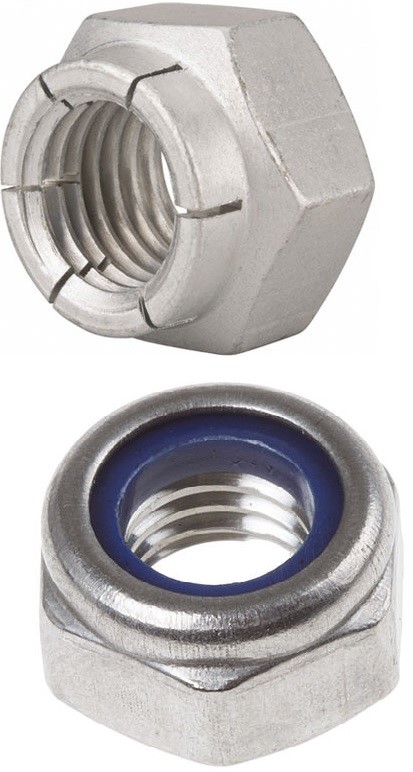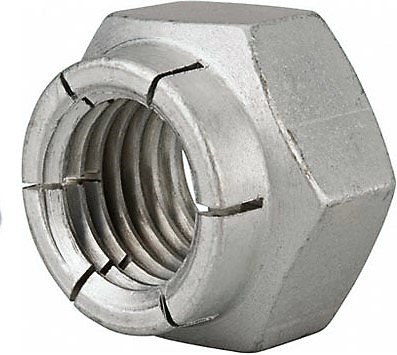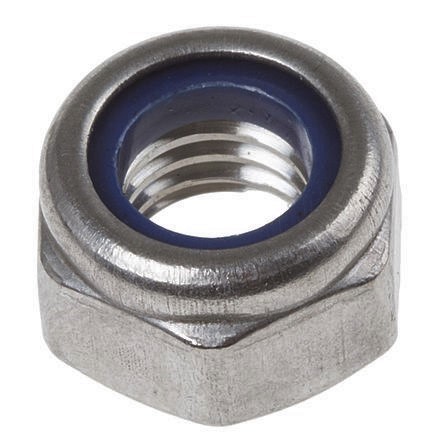Good high temperature oxidation resistance to 2000°F
High temperature stability for moderate strength applications
- Good oxidation and carburization resistant to 2000°F
- Resistance to moderate sulfidation and nitriding
- Economic alternative to high temperature nickel alloys
- 310SS chemistry & specifications
- Features & benefits of 310SS lock nuts
- Datasheet for 310 stainless steel
Designed for high temperature applications, 310 stainless steel lock nuts provide high temperature oxidation resistance to 2000°F under mild cyclic conditions. An economic alternative to nickel alloys like alloy 330 or Inconel, 310 lock nuts provide slightly less strength and temperature resistance – but at a significantly lower price point. Alloy 310 can be used in moderately caburizing, moderately oxidizing, nitriding, cementing and thermal cycling applications when not used at the maximum service temperature. 310SS lock nuts also have good resistance to sulfidation and other forms of hot corrosion. Although primarily known for its high temperature properties, 310 stainless steel also provides excellent performance at cryogenic temperatures, with toughness down to -450˚F. Though 310 is ideal for high temperature use, it should not be exposed to the severe thermal shock of repeated liquid quenching or where aqueous corrosive contaminants are present.
Benefits
- High temperature resistance.
- Excellent resistance to oxidation under mildly cyclic conditions.
- Good resistance to sulfidation and atmospheres where sulfur dioxide gas is encountered at elevated temperatures.
- Good resistance to thermal fatigue.
- Excellent toughness to cryogenic temperatures of -450°F.
- Low magnetic permeability.
- Good ductility and weldability.
Applications
- Thermal processing and high temperature furnaces rely on 310 lock nuts for their high temperature and oxidation resistance in minor cyclic conditions.
- 310SS nuts are commonly used in the petrochemical industry for their ability to provide resistance to moderately carburizing atmospheres.
- The high temperature properties of 310 lock nuts make them ideal for ore processing, steel plants, power generation, and sintering.
- Cryogenic structures often use 310 stainless steel nuts for their strength at -450°F and low magnetic permeability.
| 310 Stainless Steel Properties | |
| Tensile Strength (ksi) | 70 |
| Yield Strength (ksi) | 30 |
| Rockwell B Hardness | 95 |
| Density (lb/in3) | 0.285 |
| Electrical Resistivity (Microhm-in at 68°C) | 30.7 |
| Modulus of Elasticity (x 106 psi) | 28.5 |
| Thermal Conductivity at 212°F (BTU/hr/ft2/ft/°F) | 8.0 |
Resources: Flange Dimensions, Flange Bolting Chart
Alloy 310 Nut Types: Hex Nut, Lock Nut
310 Stainless Steel Chemistry & Specifications
310SS Specifications: AMS 5521, AMS 5651, ASME SA 240, ASME SA 312, ASME SA 479, ASTM A 240, ASTM A 276, ASTM A 276 Condition A, ASTM A 276 Condition S, ASTM A 312, ASTM A 479, EN 10095, UNS S31008, UNS S31009, Werkstoff 1.4845

310SS Locknut Features and Benefits
A 310 locknut resists loosening from vibrations and torque. One of the most common styles is a prevailing torque locknut. This kind of 310SS locknut has a prevailing torque feature which deforms elastically, preventing it from freely spinning like a standard nut.
The two most common and reliable forms of prevailing torque locknuts are the flexloc style and the polymer insert lock nut. A 310SS flexloc nut is all-metal in composition with a segmented collar that creates six “locking fingers,” that act as a spring. 310 polymer insert lock nuts are often referred to as nylon insert locknuts, although various high performance polymers can be used for the screw threads to “bite into.” Both flexlock and polymer insert locknuts are available in both hexagonal and 12 point configurations.
All Metal Flexloc Lock Nut |  Polymer/Nylon Insert Lock Nut Polymer/Nylon Insert Lock Nut |
|
|
Other all metal lock nuts available include the 310SS stover and elliptical styles. Though these styles are often a cheaper initial cost, they are less reliable than the flexloc style. As these styles delivering less prevailing torque cycles and often result in more failures, the flexloc style is a better investment for both reliability and cost savings.
